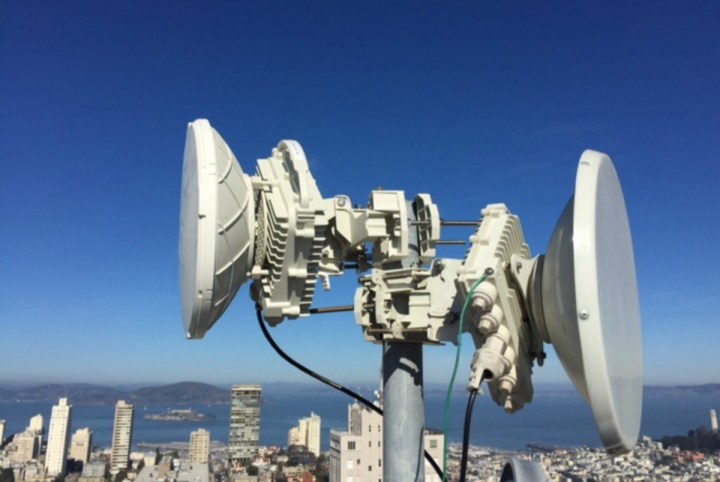
In a related development, Webpass announced that it would expand to select residential markets in Denver. “[Customers whose] buildings are wired with Ethernet will be able to contact Webpass and sign up for superfast internet service,” a company spokesperson said in a statement.
Webpass offers unlimited downloads and uploads at speeds of up to 1Gbps for $60 a month in Boston, Miami, Oakland, Sand Diego, San Francisco. Access, the Google parent company responsible for Google Fiber, purchased it in October.
Unlike Google Fiber, Webpass doesn’t rely on fiber wire to deliver high-speed internet. Instead, it employs millimeter wave technology that beams high-frequency waves from powerful base stations to receivers mounted on the tops of buildings. It isn’t perfect — the signals are subject to atmospheric interference, network congestion, and the number of subscribers using the connection at any given time — but it’s often cheaper to deploy in particularly dense urban environments.
And it’s unlikely to face the sorts of legal challenges triggered by Google’s fiber efforts. AT&T, Charter, and Comcast have sued to stop city ordinances in Nashville and Louisville that would make it easier for Google to access utility polls.
Google Fiber has been in limbo, recently, pending a shift in expansion strategy. Alphabet, Google’s parent company, reduced the Access team’s staff and “paused” fiber rollouts in 10 cities. Currently, Google services nine metro areas, including Atlanta, Austin, Charlotte, Kansas City (in Missouri and Kansas), Nashville, Salt Lake City, and Provo, Utah. It’s scheduled to launch in Irvine, California; San Antonio, Texas; Louisville, Kentucky; and Huntsville, Alabama, in the coming months.
“We have refined our plan going forward to achieve these objectives,” Barrett wrote in a blog post announcing the layoffs. “It entails us making changes to focus our business and product strategy. Importantly, the plan enhances our focus on new technology and deployment methods to make superfast internet more abundant than it is today.”
At an Alphabet shareholder’s meeting earlier this year, chairman Eric Schmidt unveiled plans to test wireless gigabit internet service that wouldn’t require “[digging] up your garden.” In October 2016, Google gained approval from the United States Federal Communications Commission to begin testing “experimental transmitters” in as many as 24 metropolitan areas throughout the country.
Editors' Recommendations
- Google’s new Bard AI may be powerful enough to make ChatGPT worry — and it’s already here
- Google now has its own way of making Android phones and Windows more compatible
- Apple Music finds its way to Google Assistant speakers and displays


